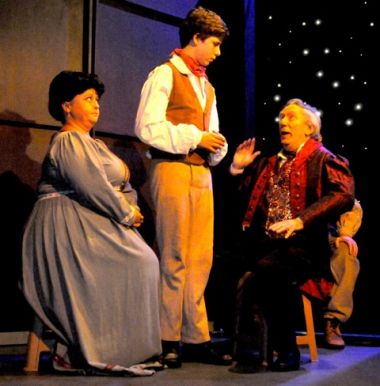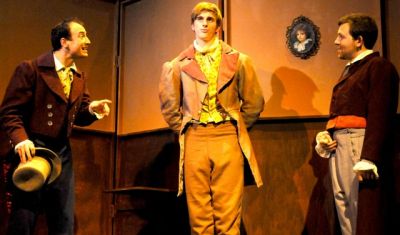Great Expectations
To adapt the 480 pages of Great Expectations to a three hour play is no mean feat. To direct that adaptation on the small Genesian theatre stage is just as ambitious. Yet Roger Gimblett has done both, very successfully. His production is a fitting celebration of Dickens’ birth 200 years ago.
The adaptation is true to Dickens’ story and his characters speak in the same delightful dialogue. Certainly some characters are missing, but that must happen in any adaptation of so long a novel with so many characters. The important thing is that any omissions don’t destroy the plot, and Gimblett has achieved that without losing any of the social and political comment or nuance that underlie Dickens’ story. Where possible, he has faithfully maintained the original dialogue, so that the characters lift easily from the page to the stage, voicing their aspirations, their fears and their failings in accents true to their class and their time.
With the action moving through so many scenes at so many locations on such a small stage, set design could be a nightmare. But on Owen Gimblett’s very carefully planned set, the scenes unfold … literally! Side walls unfold to become Joe Gargery’s forge and young Pip’s home. Tall hedges slide across the stage to become the walls of Miss Havisham’s manor, and turn to become her boudoir, into which she slides through a raised curtain flat. Other flats fold out to become Pip’s London apartment and the banks of the Thames.
 All scene changes are smooth and relatively fast and quiet. The design and its implementation are a credit to both director and designer, who obviously worked closely together to achieve a collaborative vision – and to the Construction Manager, Grant Fraser, and his crew, who managed what was surely a testing build. Once on the stage, the choreography of blocking the scene changes must have been almost as challenging as directing the action. Congratulations therefore to Stage Manager Caroline Gage, and the cast themselves, who manage so many configurations so often.
All scene changes are smooth and relatively fast and quiet. The design and its implementation are a credit to both director and designer, who obviously worked closely together to achieve a collaborative vision – and to the Construction Manager, Grant Fraser, and his crew, who managed what was surely a testing build. Once on the stage, the choreography of blocking the scene changes must have been almost as challenging as directing the action. Congratulations therefore to Stage Manager Caroline Gage, and the cast themselves, who manage so many configurations so often.
Michael Schell’s sound and lighting design compliment the set and the action. He provides an atmosphere that denotes the cold dankness of the marshes and the crowded fogginess of 18th century London. The curtain opens to an eerie, echoing soundscape with young Pip (Sam Seccombe) visiting his parents’ graves on the dark, foggy edges of the marsh. The appearance of Magwitch (Tom Massey) from the gravestones is just as frightening as I remember it in the black and white movie I saw as a child. Massey is fearful and threatening and demanding – and Pip, afraid, complies with his demands. Thus the background to the story is set.
With sixteen actors, playing eighteen characters and some non-speaking roles, this is a big cast. The characters they play have been imagined by many readers over many years, as well as being brought to life on big and small screen. It is a challenge to take on such well known and well loved characters. Many of the cast do this remarkably well.
 Martin Searles, as Joe Gargery is outstanding. With careful timing and halting gesture, he re-creates the warm, understanding character whose steadfast acceptance of life and honest love for Pip is the rock on which the story is built. His ‘Joe’ reaches out to the audience who take him to their hearts. His joy as he explains his recognition of the letters of his name is a very special moment and epitomises his capture of the character. New to Sydney from Canberra, Searles is certainly an asset to the local community theatre scene.
Martin Searles, as Joe Gargery is outstanding. With careful timing and halting gesture, he re-creates the warm, understanding character whose steadfast acceptance of life and honest love for Pip is the rock on which the story is built. His ‘Joe’ reaches out to the audience who take him to their hearts. His joy as he explains his recognition of the letters of his name is a very special moment and epitomises his capture of the character. New to Sydney from Canberra, Searles is certainly an asset to the local community theatre scene.
Lachlan Edmonds-Munro plays the older Pip, mixing wide-eyed innocence with awkward social ambition. When he forgoes this and gives way to caring and understanding, his performance is real and heart warming.
Ros Bilbe brings her wealth of experience to the role of Miss Havisham. Her measured delivery and moments of stillness and introspection are carefully controlled. Her command of space and audience is strong, as is that of Rob Drew who returns to the Genesian stage to play the lawyer, Mr Jaggers.
Timothy Bennet plays two roles – the garrulous Uncle Pumblechook, and Jaggers’ defferential clerk, Wemmick – and finds the specific humour and vulnerability in both characters.
Kate Parker-Frost is delightful as Biddy and Alexis Farr suitably cold and distant as the hard-hearted Estella.
As Herbert Pocket, Pip’s friend and ‘guide’ to London and the social niceties of the upper class, Nichols Pond is fast and funny. His energy and vitality in his first scene – tripping and feinting as he goads Pip to a fight – sets a pace and personality that he does not lose throughout the play.
The whole cast works strongly together in this ensemble production which is a credit to Roger Gimblett’s creative vision and direction – and obvious love of and respect for the characters that Charles Dickens created so many years ago.
Carol Wimmer
Photographer: Craig O'Regan
Click here to check out the electronic version of the May / June edition of Stage Whispers for free.
Subscribe to our E-Newsletter, buy our latest print edition or find a Performing Arts book at Book Nook.

